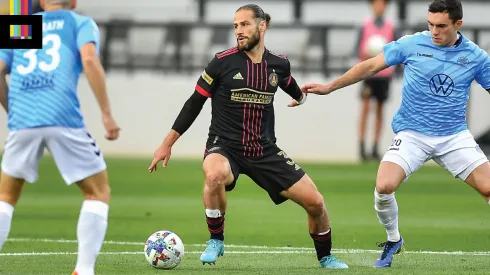Supporters and members actually owning part of their favorite clubs is not uncommon across the soccer world. In some places, such as the German Bundesliga, it’s actually a league rule. But fan ownership in MLS is impossible.
A practice that allows a community to directly control its own local club seems a logical idea. So why would Major League Soccer not want to partake? In actuality, it goes beyond the league itself. But first let’s look at a few examples from around the world.
Global Precedent
Fan ownership is something that is not out of the ordinary around the world.
Germany has what is known as the “50+1” rule. This is a regulation that stipulates that to participate in the Bundesliga, a club must either wholly- or majority-own its soccer team. That means 50% of the votes plus one vote must belong to the club (i.e. the members), with any remaining votes belonging to investors. Notable exceptions to the rule are company-owned teams such as VfL Wolfsburg and Bayer Leverkusen with both have company origins that predate the Bundesliga. Then there is RB Leipzig, who debatably are using a loophole to effectively have a company-controlled team.
Sweden uses a similar rule for all sports, known as “51 percent,” where only non-profit clubs can compete in their league system.
Real Madrid CF and FC Barcelona, two of the biggest clubs in the world, are both completed owned by their supporters.
Supporter ownership closer to home
Supporter or community ownership in major American professional sports simply doesn’t exist. The lone exception is the Green Bay Packers of the National Football League. The Packers are owned by a non-profit corporation (and have been for 100 years) that today has more than 537,000 shareholders. The Packers were grandfathered in when the league set up its current ownership rules in the 1980s.
In American soccer, there are a few supporter-owned clubs operating in the lower ranks. San Francisco City FC plays in the USL League Two, and is 51% supporter-owned. Lansing Common FC was founded as a non-profit, member-supported team after Lansing Ignite, one of the inaugural teams in USL League One, abruptly folded after just one season. Chattanooga FC, while still in the amateur National Premier Soccer League, raised more than $800,000 from over 3,000 individual owners in 2018. In 2020, Detroit City FC, now in USL, raised over $1,000,000 in five days from over 2,000 new owners in a similar offering.
But higher up in the pyramid, supporter ownership is nonexistent. The reason why is largely due to the US Soccer Federation.
The soccer law of the land in the US
The United States Soccer Federation utilizes something called the Professional League Standards when it comes to sanctioning professional leagues in the country.
These are a set of stipulations – factors such as market population, stadium capacity, time zones, and number of teams – that leagues must meet in order to receive sanctioning for either Division 1, 2 or 3 status in the US.
One of these stipulations is owner net worth. This requires that each team must designate a principal owner as part of its group, with a controlling interest that owns at least 35% of the team. This is very similar to the NFL’s ownership rules. In addition, this owner must have a certain net worth, based on the division. For MLS, this is $40 million for Division 1 (the net worth figure scales down for women’s leagues and men’s lower division leagues). The entire ownership group must be worth at least $70 million for a Division 1 team. Clubs cannot be owned by a non-profit corporation, regardless of financial viability.
These stipulations effectively make true fan ownership in MLS (and NWSL and USL) impossible. In addition, the single-entity structure of MLS adds another layer of complexity.
The single entity factor
Each team’s ownership group is actually an investor-operator of a franchise in a specific location, and is also a shareholder of the league itself, which centrally controls all player contracts in the league. Effectively, MLS is one big business. Having a non-profit entity with potentially tens of thousands of members would not jive within that structure.
The closest thing to any sort of fan ownership in MLS is with the Seattle Sounders. The team has something called the Sounders FC Alliance. This program sees members given the ability to vote on the team general manager and other team decisions. But of course this is not ownership. Many teams (in MLS and other American sports) have recently taken to referring to season ticket plans as “Season Ticket Memberships.” They’ll offer certain exclusive merchandise and events, discounts, and other perks. But these season ticket “members” are really just customers – holding no voting rights or other form of influence at all.
Implications for the US domestic game
Would supporter ownership be a positive injection in American soccer? There are several potential positive benefits, but of course every community and club is different, so it may not be right for everywhere.
Keeping clubs around
For one thing, let’s talk about clubs folding and relocating. With supporter-controlled clubs, that’s very hard to see happen. A club with supporter ownership could make the choice to self-relegate to (or start off in the first place in) a lower division they could afford. Most teams fold up completely when a single owner decides they are losing too much money. Community ownership would surely prevent shady relocation schemes – like what nearly happened in Columbus in MLS, and countless other times across American sports.
Let’s look back at the Green Bay Packers. Without community ownership, there is no way they would still be in Green Bay. Similarly, if the NFL was founded today, there is zero chance the small city would even be considered for a team (Green Bay has a population of 107,000). But they have remained one of the most successful and popular teams in the league throughout their history. Stifling ownership rules would have never given them a chance.
Guide to Major League Soccer
IMProved engagement & REVENUE
The chance to own your local and/or favorite club would certainly stoke increased engagement with communities everywhere. There’s a different attitude and energy when you truly have a stake in something. Opening the game to supporter ownership could energize existing clubs and spark the creation of countless new ones. Offering supporters shares and/or membership in the club can also be an injection of revenue to a club.
A CHECK AGAINST GREED AND FOOLISH MOVES
That increased engagement and direct involvement could also prevent costly snafus from clubs. (Re)branding missteps in places such as Chicago, Montréal and Columbus likely never happen when supporters need to approve such things. Similarly, sponsorships with dodgy corporations also would be unlikely to pass muster with supporters.
potential pitfalls
Of course, ownership primarily made up of supporters is not without potential drawbacks. A club could find itself struggling to compete without a main money man. American clubs aren’t revenue generating juggernauts like Madrid, Barca or Bayern. After all, most American professional clubs still lose money each year. A rethinking of how (and how much) money is spent and what kind of talent is possible would certainly have to accompany pro clubs with community ownership. And with poor elected leadership, clubs could easily get themselves into a downward spiral of trouble.
Though not without its downsides, partial or full supporter ownership in American pro soccer could certainly be a welcome addition to the landscape.
Would you want to see fan ownership in MLS and other leagues in the US? Let us know in the comments.















